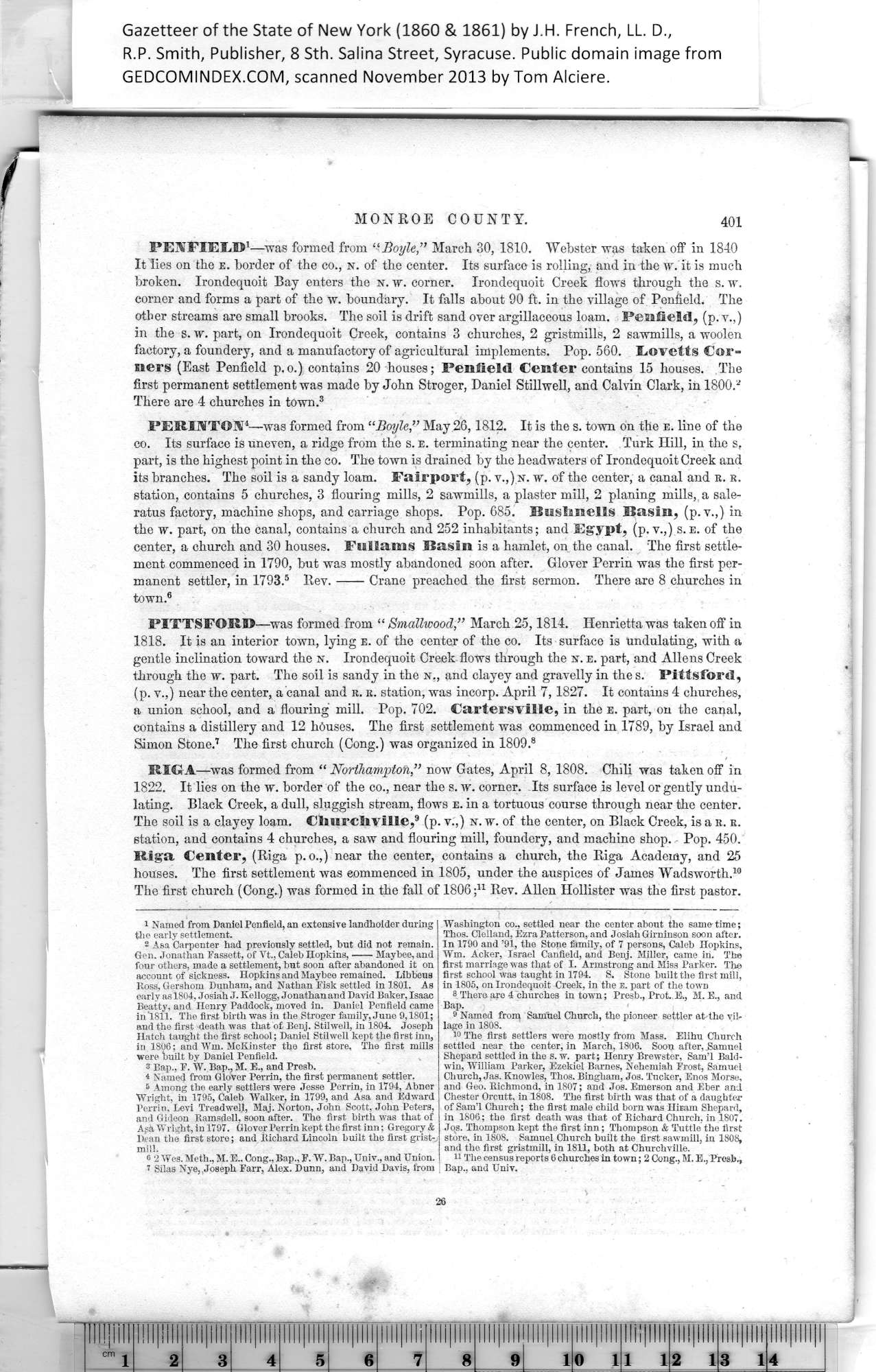|
MONROE COUNTY.
PEIVFIEED1—was formed from “BoyleMarch 30, 1810. Webster was taken off in 1840
It lies on the e. border of the co., n. of the center. Its surface is rolling, and in the w. it is much
broken. Irondequoit Bay enters the n. w. corner. Irondequoit Creek flows through the s. w.
corner and forms a part of the w. boundary. It falls about 90 ft. in the village of Penfield. The
other streams are small brooks. The soil is drift sand over argillaceous loam. Penfield, (p. v.,)
in the s. w. part, on Irondequoit Creek, contains 3 churches, 2 gristmills, 2 sawmills, a woolen
factory, a foundery, and a manufactory of agricultural implements. Pop. 560. Bovetts Cor-
ners (East Penfield p.o.) contains 20 houses; Penfield Center contains 15 houses. The
first permanent settlement was made by John Stroger, Daniel Stillwell, and Calvin Clark, in 1800.*
There are 4 churches in town.2
PERINTON3—was formed from “Boyle,” May 26,1&12. It is the s. town on the e. line of the
co. Its surface is uneven, a ridge from the s. e. terminating near the center. Turk Hill, in the s,
part, is the highest point in the co. The town is drained by the headwaters of Irondequoit Creek and
its branches. The soil is a sandy loam. Eairport, (p. v.,) n. w. of the center, a canal and r. r.
station, contains 5 churches, 3 flouring mills, 2 sawmills, a plaster mill, 2 planing mills, a sale-
ratus factory, machine shops, and carriage shops. Pop. 685. Buslmellg Basin, (p.v.,) in
the w. part, on the canal, contains a church and 252 inhabitants; and Egypt, (p.v.,) s.e. of the
center, a church and 30 houses. Fullams Basin is a hamlet, on the canal. The first settle¬
ment commenced in 1790, but was mostly abandoned soon after. Glover Perrin was the first per¬
manent settler, in 1793.4 Rev. Crane preached the first sermon. There are 8 churches in
town.5
PITTSFORD—was formed from “ Smallwood,” March 25,1814. Henrietta was taken off in
1818. It is an interior town, lying e. of the center of the co. Its surface is undulating, with a
gentle inclination toward the n. Irondequoit Creek flows through the sr. e. part, and Allens Creek
through the w. part. The soil is sandy in the n., and clayey and gravelly in the s. Pittsford,
(p. v.,) near the center, a canal and r. r. station, was incorp. April 7,1827. It contains 4 churches,
a union school, and a flouring mill. Pop. 702. Cartersville, in the e. part, on the canal,
contains a distillery and 12 hduses. The first settlement was commenced in 1789, by Israel and
Simon Stone.6 The first church (Cong.) was organized in 1809.7
RIGA—was formed from “ Northampton,” now Gates, April 8, 1808. Chili was taken off in
1822. It lies on the w. border of the co., near the s. w. corner. Its surface is level or gently undu¬
lating. Black Creek, a dull, sluggish stream, flows e. in a tortuous course through near the center.
The soil is a clayey loam. Churcliville,8 (p. v.,) n.w. of the center, on Black Creek, is a R. r.
station, and contains 4 churches, a saw and flouring mill, foundery, and machine shop. Pop. 450.
Riga Center, (Riga p.o.,) near the center, contains a church, the Riga Academy, and 25
houses. The first settlement was commenced in 1805, under the auspices of James Wadsworth.10
The first church (Cong.) was formed in the fall of 1806 j11 Rev. Allen Hollister was the first pastor.
|
Washington co., settled near the center about the same time;
Thos. Clelland, Ezra Patterson, and Josiah Girninson soon after.
In 1790 and ’91, the Stone family, of 7 persons, Caleb Hopkins,
Wm. Acker, Israel Canfield, and Benj. Miller, came in. The
first marriage was that of I. Armstrong and Miss Parker. The
first school was taught in 1794. S. Stone built the first mill,
in 1805, on Irondequoit Creek, in the e. part of the towD
8 There are 4 churches in town; Presb., Prot. E., M. E., and
Bap.
9 Named from Samuel Church, the pioneer settler at the vil¬
lage in 1808.
i° The first settlers were mostly from Mass. Elihu Church
settled near the center, in March, 1806. Soon after, Samuel
Shepard settled in the s. w. part; Henry Brewster, Sam’l Bald¬
win, William Parker, Ezekiel Barnes, Nehemiah Frost, Samuel
Church, Jas. Knowles, Thos. Bingham, Jos. Tucker, Enos Morse,
and Geo. Richmond, in 1807; and Jos. Emerson and Eber and
Chester Orcutt, in 1808. The first birth was that of a daughter
of Sam’l Church; the first male child born was Hiram Shepard,
in 1806; the first death was that of Richard Church, in 1807.
Jos. Thompson kept the first inn; Thompson & Tuttle the first
store, in 1808. Samuel Church built the first sawmill, in 1808,
and the first gristmill, in 1811, both at Churchville.
u The census reports 6 churches in town; 2 Cong., M. E., Prosb.,
Bap., and Univ. |
1
Named from Daniel Penfield, an extensive landholder during
tlie early settlement.
2
2 Bap., F. W. Bap., M. E., and Presb.
3
Named from Glover Perrin, the first permanent settler.
4
8 Among the early settlers were Jesse Perrin, in 1794, Abner
Wright, in 1795, Caleb Walker, in 1799, and Asa and Edward
Perrin, Levi Treadwell, Maj. Norton, John Scott, John Peters,
and Gideon Ramsdell, soon after. The first birth was that of
5
Aph Wright, in 1797. Glover Perrin kept the first inn; Gregory*
6
Dean the first store; and Richard Lincoln built the first grist¬
mill.
7
2 Wes. Meth., M. E., Cong., Bap., F. W. Bap., Univ., and Union.
8
1 Silas Nye, ,Joseph Farr, Alex. Dunn, and David Davis, from
|
